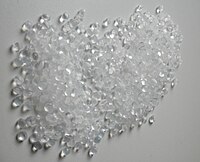
Photo from wikipedia
Ultrasonic vibration can accelerate the curing of epoxy resin. Previous studies have not clarified the mechanism of ultrasonic vibration for accelerating the curing of epoxy resins. And the mechanical and… Click to show full abstract
Ultrasonic vibration can accelerate the curing of epoxy resin. Previous studies have not clarified the mechanism of ultrasonic vibration for accelerating the curing of epoxy resins. And the mechanical and thermal properties of the adhesive after ultrasonic-accelerated curing have not been clearly analyzed. In this study, the conventional thermal and ultrasonic-assisted curing processes of the bicomponent adhesive 3 M DP420 were characterized by tensile testing, thermogravimetric analysis, differential scanning calorimetry, dynamic mechanical analysis and Fourier transform infrared spectroscopy. The results show that the curing rate of the adhesive can be increased by 50% by ultrasonic pretreatment. The tensile test results show that ultrasonic pretreatment can increase the tensile strength by 30.9%. Pulsed ultrasonic treatment can keep the temperature of the adhesive stable during the pretreatment process, and does not excessively raise the temperature. The thermal analysis results show that pulsed ultrasonic treatment can accelerate the curing process without the loss of mechanical properties or thermal stability. It was observed that the glass transition temperature shifted to a higher value when the curing temperature increased. Ultrasonic vibration promotes mass transfer between the epoxy resin and curing agent and increases the collision probability between the reactants, thus increasing the reaction rate. In addition, it was found that the temperature field has a significant effect on the properties of the adhesive, and medium-temperature curing is more suitable for curing the adhesive.
Journal Title: Materials Research Express
Year Published: 2021
Link to full text (if available)
Share on Social Media: Sign Up to like & get
recommendations!